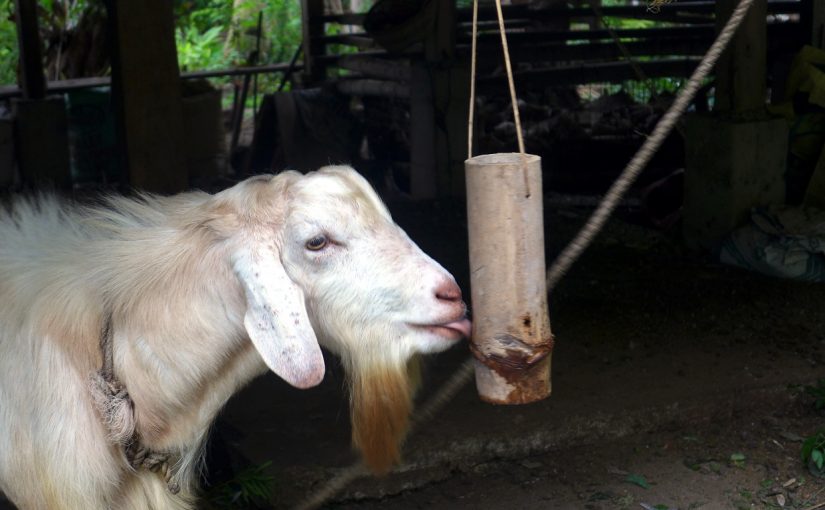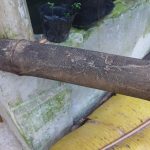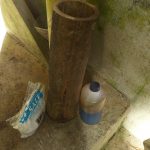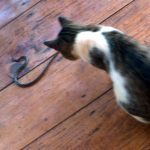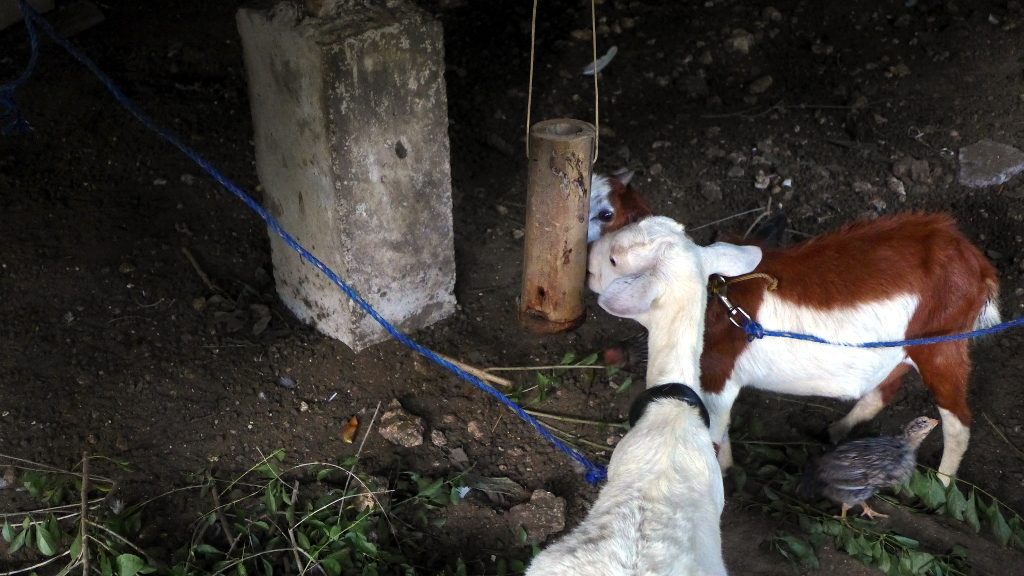
We currently have only 3 goats – the billy goat Latte and his two kids, now 11 months old, Bulak and Tableya. The kids are OK but not gaining much weight and their coat are dull, rough and fluffed up. The problem may be partly due to their mother – also not in the best condition and rather aged – weaning them too early. Plus, the possibility of parasitic overload, competing for nutrition. We have been pasturing our goats like everyone else here in the village, but bad weather conditions throughout 2016 have made life more difficult for the animals. A lot of goats in the village have become sick and died, so we have been lucky to manage to keep ours alive.
Not wanting to push our luck, we decided to do something about supplementing our goats’ diet to keep them healthy. We started by deworming them. We use a product called “Valbazen” – a broad spectrum oral suspension dewormer. However, we use dewormers only when needed, since overuse can lead to parasitic resistance. In our case, we have used dewormers only once a year and at times use natural dewormers such as Ipil-Ipil and Caimito leaves.
After deworming, we made a simple salt dispenser as supplement for the goat’s diet. Earlier, we thought of purchasing a salt lick or mineral block. However, instead of added expense and a large block that only 3 goats will be using, we thought it might be better to just start by making our own.
The dispenser is a piece of bamboo, open at one end and closed at the node end. Holes are made at the closed end to allow melted salt to slowly seep through. According to Low Cost Feeds and Feeding Methods for Livestock, “It may also be necessary to scrape the outer skin of the tube to allow the natural exit of liquid through the pores of the bamboo. The tube is then filled with salt, and a small amount of water is added to initiate liquefying of the salt. The tube is then strategically hung inside the shed at a height where the animals can reach and lick it. Water is made available nearby.”
The bamboo as dispenser is inexpensive, safe and non-corrosive. It only allows slow seepage of dissolved salt ensuring that the goats will not have too high of salt intake.
Benefits of Salt in Goats’ Diet
- Salt is one of minerals essential to goat health along with calcium and phosphorous
- Salt encourages goats to drink more water; fresh clean water is essential to diluting the urine and preventing the formation of stones or urinary calculi particularly in male breeding goats
In addition to salt, we decided to add a small amount of molasses. The molasses is added on top of the salt in the dispenser. Only a small amount is used, about 10% or less of the salt provided. Although molasses has many advantages, it is also not recommended for goats in high amounts.
Benefits of Low Levels of Molasses in Goats’ Diet
- Improves palatability of processed feeds
- Provides Vitamin B6, magnesium and potassium
- Provides energy
If the goat has little access to forage, high levels of molasses in the diet is not advisable. According to Molasses as Animal Feed: “When molasses accounts for more than 50 percent of the diet, the digestibility of all types of feeds that accompany the molasses is depressed often to the point of only half the value recorded when molasses is not given (Encarnación and Hughes-Jones, 1981). These effects are obviously undesirable if the accompanying feed is composed mainly of cell wall carbohydrate: however, if the feed is rich in protein, starch or lipids-which can be digested by gastric enzymes in the small intestine-then depressing the extent to which these nutrients are fermented in the rumen becomes an advantage to the host animal.”
Goats fed on a high-molasses diet (more than 50% of total diet) are also at risk of developing urinary calculi. Molasses is high in potassium and reduces the absorption of calcium. This deficiency results to an imbalance in the calcium to phosphorous ratio triggering the formation of phosphate salts which block the urinary passages of goats.
So, as a supplement, salt and molasses are advantageous but should only be given in addition to a good diet consisting of ample fibre, protein and water.
